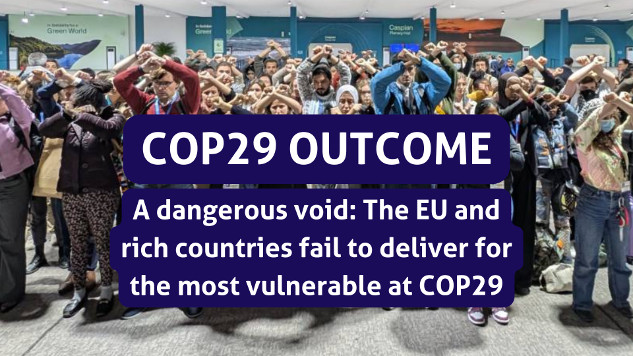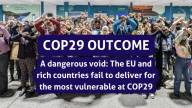
Protesters expose the failure of rich nations and the EU to protect the most vulnerable, as fossil fuel interests dominate the climate agenda.
In this Article:
- How are fossil fuel lobbyists influencing COP29 outcomes?
- Why is mass migration and economic collapse becoming unavoidable inaction costs?
- What does exceeding the 1.5°C threshold mean for our future?
- Can grassroots movements reclaim climate action from corporate interests?
- What immediate steps must we take to counter climate inertia?
COP29 and the Climate Emergency: A Summit in the Shadow of Fossil Fuel Lobbyists
by Robert Jennings, InnerSelf.com
As global temperatures continue to soar and the effects of climate change become more undeniable, the world looked to COP29 for solutions. This international summit meant to unite nations in the fight against the climate crisis was overshadowed by the growing influence of fossil fuel lobbyists. What should have been a platform for actionable progress was devolved into a spectacle of political inertia and corporate interference.
The stakes couldn’t be higher. The accelerating pace of global warming is not just a matter of rising temperatures; it is an existential threat to international stability. Failing to act decisively now will usher in a future marked by mass migration, economic collapse, and untold human suffering from catastrophic weather events. The warnings are not distant abstractions—they are today’s reality, rapidly escalating beyond our control.
The Reality of Accelerating Warming
The Earth is sending increasingly urgent warning signals. Global temperatures have exceeded the 1.5°C threshold for over a year—a critical line scientists have long cautioned against crossing. While some argue this is a temporary spike, primarily driven by an ongoing El Niño, the broader picture is far more troubling.
Natural cooling cycles like La Niña have failed to bring temperatures down enough to offset the relentless rise caused by human activities. Even during cooling phases, baseline temperatures remain higher than just decades ago. This trend exposes a hard truth: human-induced warming has overwhelmed the natural systems that once buffered our planet.
Despite this, the framework of international climate negotiations remains stubbornly tied to “long-term averages.” This outdated approach allows policymakers to sideline the present crisis, focusing instead on vague, distant targets like 2050. It’s a convenient delay tactic the planet can no longer afford.
The Looming Threat of Mass Migration and Economic Collapse
The consequences of continued inaction will not be felt equally, but they will touch every corner of the globe. As rising sea levels, extreme heat, and worsening droughts render entire regions uninhabitable, we are already witnessing the beginning of a massive migration crisis. Tens of millions of people from countries in Africa, Asia, and Latin America are being forced to leave their homes in search of safety and resources.
This is not a distant future scenario. The World Bank estimates that by 2050, over 200 million people will be displaced due to climate change, which could climb much higher if warming accelerates. These mass movements will strain fragile political systems, destabilize economies, and lead to widespread resource conflict. Wealthier nations, many of which are responsible for the majority of greenhouse gas emissions, are erecting walls and fortifying borders instead of addressing the root causes of displacement.
At the same time, the global economy faces unprecedented risks. Agriculture is collapsing under severe droughts, floods, and erratic weather patterns, threatening billions of food supplies. Rising seas and extreme weather events are destroying infrastructure in major cities, creating costs that no nation is equipped to bear. Entire industries reliant on predictable weather and stable ecosystems are on the brink of collapse.
The global financial system, deeply interwoven with fossil fuel investments, is teetering on the edge of systemic failure. When climate disasters hit major economic hubs, the ripple effects will be felt everywhere, triggering recessions or even depressions that make the 2008 financial crisis look mild by comparison.
The Fossil Fuel Shadow Over COP29
The irony of COP29 is glaring: a summit ostensibly dedicated to combating climate change has become a playground for fossil fuel interests. Reports show that the number of fossil fuel lobbyists attending the conference rivals, if not exceeds, the presence of environmental advocates. These representatives of oil, gas, and coal industries are not there to champion a cleaner future—they’re there to protect their bottom line.
At past summits, voluntary pledges and watered-down commitments have allowed major polluters to escape accountability. At COP29, fossil fuel lobbyists have doubled down, promoting carbon capture technologies and “net-zero” narratives that enable continued extraction and combustion of fossil fuels. These tactics create an illusion of progress while delaying the structural changes needed to phase out fossil fuel dependence.
Why COP29’s Framework Failed
The shortcomings of COP29 go beyond the presence of lobbyists. The entire framework of the summit is built on a foundation of compromise, often at the expense of meaningful action. Long-term targets dominate discussions, like limiting warming to 1.5°C by 2050. Meanwhile, the short-term breaches we are experiencing now—breaches that devastate vulnerable communities—are treated as statistical blips rather than urgent emergencies.
To make matters worse, there needs to be a mechanism to enforce the pledges made at these conferences. Countries and corporations routinely fail to meet their targets with little to no consequences. The disconnect between scientific realities and political outcomes at COP29 has left the world vulnerable to climate catastrophe.
The Climate Justice Perspective
The most heartbreaking consequence of this failure is its impact on the world’s most vulnerable. While wealthy nations debate incremental progress, low-lying islands and impoverished communities bear the brunt of rising seas, extreme weather, and food insecurity. These nations have the least responsibility for greenhouse gas emissions but suffer the most significant consequences.
Fossil fuel interests at COP29 have also worked to delay critical funding for loss and damage—a mechanism meant to provide reasonable financial support to countries grappling with the irreversible impacts of climate change. The hypocrisy is staggering: wealthy nations subsidize fossil fuel industries with billions of dollars while failing to deliver on their promises to aid those on the frontlines of the crisis.
Reclaiming Climate Action
The failures of COP29 should not lead to despair but should be resolved. If the current framework cannot deliver results, it must be reimagined. Removing fossil fuel lobbyists from the negotiating table is a necessary first step. These summits cannot simultaneously serve the interests of polluters and the planet.
Second, voluntary pledges must be replaced with legally binding agreements. Nations and corporations must be accountable for their commitments, with clear penalties for failure. Climate-vulnerable nations should also have a stronger voice in negotiations, ensuring their needs and perspectives guide global action.
Finally, real change will come from more than just the top. Grassroots movements, climate activists, and everyday citizens have always been the driving force behind progress. By holding governments and corporations accountable, people-powered movements can reclaim the narrative and push for solutions rooted in justice and equity.
Time for Action, Not Apathy
COP29 could have been a turning point. Instead, it has become a stark reminder of the forces working against climate progress. The influence of fossil fuel lobbyists, the reliance on long-term averages, and the lack of enforceable action have all contributed to its failures. But the fight for a livable planet is far from over.
What lies ahead is an environmental challenge and a full-scale humanitarian and economic crisis. If current trends continue, we face a world of mass suffering—billions displaced, economies shattered, and societies unraveling under the pressure of worsening climate disasters.
We must act quickly for distant targets and hope the next summit will deliver what this one did not. The time for action is now. The Earth is warming faster than ever, and so must our resolve to confront the crisis head-on. The stakes are clear, the science is undeniable, and the choice is ours. The question is: will we act or let the future slip through our hands?
About the Author
 Robert Jennings is co-publisher of InnerSelf.com with his wife Marie T Russell. He attended the University of Florida, Southern Technical Institute, and the University of Central Florida with studies in real estate, urban development, finance, architectural engineering, and elementary education. He was a member of the US Marine Corps and The US Army having commanded a field artillery battery in Germany. He worked in real estate finance, construction and development for 25 years before starting InnerSelf.com in 1996.
Robert Jennings is co-publisher of InnerSelf.com with his wife Marie T Russell. He attended the University of Florida, Southern Technical Institute, and the University of Central Florida with studies in real estate, urban development, finance, architectural engineering, and elementary education. He was a member of the US Marine Corps and The US Army having commanded a field artillery battery in Germany. He worked in real estate finance, construction and development for 25 years before starting InnerSelf.com in 1996.
InnerSelf is dedicated to sharing information that allows people to make educated and insightful choices in their personal life, for the good of the commons, and for the well-being of the planet. InnerSelf Magazine is in its 30+year of publication in either print (1984-1995) or online as InnerSelf.com. Please support our work.
Creative Commons 4.0
This article is licensed under a Creative Commons Attribution-Share Alike 4.0 License. Attribute the author Robert Jennings, InnerSelf.com. Link back to the article This article originally appeared on InnerSelf.com
Recommended Books:
Yellowstone's Wildlife in Transition
 Over thirty experts detect worrying signs of a system under strain. They identify three overriding stressors: invasive species, private-sector development of unprotected lands, and a warming climate. Their concluding recommendations will shape the twenty-first-century discussion over how to confront these challenges, not only in American parks but for conservation areas worldwide. Highly readable and fully illustrated.
Over thirty experts detect worrying signs of a system under strain. They identify three overriding stressors: invasive species, private-sector development of unprotected lands, and a warming climate. Their concluding recommendations will shape the twenty-first-century discussion over how to confront these challenges, not only in American parks but for conservation areas worldwide. Highly readable and fully illustrated.
For more info or to order "Yellowstone's Wildlife in Transition" on Amazon.
The Energy Glut: Climate Change and the Politics of Fatness
 by Ian Roberts. Expertly tells the story of energy in society, and places 'fatness' next to climate change as manifestations of the same fundamental planetary malaise. This exciting book argues that the pulse of fossil fuel energy not only started the process of catastrophic climate change, but also propelled the average human weight distribution upwards. It offers and appraises for the reader a set of personal and political de-carbonising strategies.
by Ian Roberts. Expertly tells the story of energy in society, and places 'fatness' next to climate change as manifestations of the same fundamental planetary malaise. This exciting book argues that the pulse of fossil fuel energy not only started the process of catastrophic climate change, but also propelled the average human weight distribution upwards. It offers and appraises for the reader a set of personal and political de-carbonising strategies.
For more info or to order "The Energy Glut" on Amazon.
Last Stand: Ted Turner's Quest to Save a Troubled Planet
 by Todd Wilkinson and Ted Turner. Entrepreneur and media mogul Ted Turner calls global warming the most dire threat facing humanity, and says that the tycoons of the future will be minted in the development of green, alternative renewable energy. Through Ted Turner's eyes, we consider another way of thinking about the environment, our obligations to help others in need, and the grave challenges threatening the survival of civilization.
by Todd Wilkinson and Ted Turner. Entrepreneur and media mogul Ted Turner calls global warming the most dire threat facing humanity, and says that the tycoons of the future will be minted in the development of green, alternative renewable energy. Through Ted Turner's eyes, we consider another way of thinking about the environment, our obligations to help others in need, and the grave challenges threatening the survival of civilization.
For more info or to order "Last Stand: Ted Turner's Quest..." on Amazon.
Article Recap
COP29 has been overshadowed by fossil fuel lobbyists who are blocking urgent climate action. With global temperatures exceeding the 1.5°C threshold, the climate crisis has escalated into a humanitarian and economic emergency. The summit's failure to address mass migration, economic collapse, and catastrophic weather underlines the urgent need for grassroots-driven, enforceable solutions.












